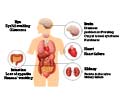Following demonstration of transmission of senile amyloidosis to offspring from affected mice, concerns about spread of the disease from mother to child have been raised. Details about the scientific study 'Transmission of amyloidosis in offspring of mice with AApoAII amyloidosis,' by Korenaga et al., can be cited in the March issue of the American Journal of Pathology.
Dementia can result from several disease mechanisms, including amyloidosis. Amyloidosis occurs when cellular proteins that normally float freely in the body form organized, nonfunctional aggregates, or fibrils that cause cellular damage. This injury can lead to such disorders as Alzheimer's disease and Creutzfeld-Jakob disease, depending on the protein involved and where the fibrils accumulate.Genetics are known to be involved in these disorders, but researchers have also shown that injecting fibrils into susceptible mice accelerates disease onset. That led researchers guided by Dr. Xiaoying Fu to ask whether pups born to affected mothers also display accelerated disease.
Using a mouse strain that carries a mutation for senile amyloidosis, Dr. Fu's group injected female mice with amyloid fibrils, to accelerate their disease, and then allowed the mice to mate and produce offspring. The mouse pups born to these mothers exhibited elevated levels of amyloid fibrils that increased with age. These fibrils were first seen in the intestines, spreading later to liver, spleen and other organs.
Interestingly, when mice born to injected mothers were nursed by control mothers (no fibrils injected), only one of nine pups had amyloid fibrils at 6 months. However, pups born to control mothers but nursed by injected mothers had amyloidosis at levels similar to that of pups born/nursed by injected mothers. The presence of fibrils in the milk of injected mothers was confirmed by protein assay and electron microscopy, and spread via the milk was demonstrated by injecting affected milk into naïve mice (fibrils were found at 3 months).
These authors use traditional 'infectivity' concepts to show that ingestion of fibrils by nursing mouse pups, and not by events occurring in utero, transmits amyloid fibrils to their offspring, thus accelerating amyloidosis. Such events have not been observed in human amyloidosis but have been suggested in sheep scrapie, a prion disease related to Creutzfeld-Jakob disease.
Prion diseases, such as scrapie and bovine spongiform encephalopathy (mad cow), are known to be transmissible, with spread among susceptible hosts demonstrated in the laboratory and in the real world. Non-prion amyloidosis, however, has not been shown to spread in such a way until now.
Advertisement
Source: Eurekalert






